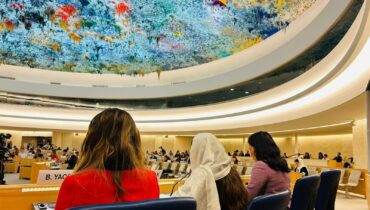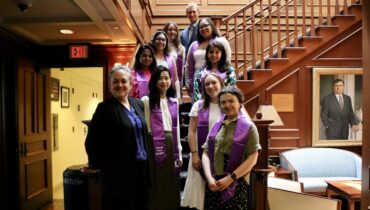On October 4, 2023—just three days before Hamas’ October 7th attack—thousands of women gathered at Jerusalem’s Tolerance Monument for a rally and march organized by the Israeli group Women Wage Peace and the Palestinian group Women of the Sun. “We, Palestinian and Israeli mothers, are determined to stop the vicious cycle of bloodshed,” reads the preamble to their campaign, the Mother’s Call. These organizations exemplify the many women peacebuilders on both sides who have been laboring for decades to bring peace and security to Israel and Palestine.
April 7, 2024 will mark six months since Hamas terrorists’ deadly assault on Israel that resulted in more than 1,100 deaths and more than 240 people being taken hostage. Israel declared war on Hamas, and it has led to more than 30,000 deaths in Gaza, mass displacement of the Palestinian population, and an unparalleled humanitarian crisis. The terrible milestone prompts us to reflect on the human toll of the war and the devastating impact the conflict is having on women and girls. It reinforces the urgency of incorporating women’s leadership and gender perspectives into all efforts to advance peace and security and to ensure humanitarian relief and recovery in Palestine and Israel.
The Georgetown Institute for Women, Peace and Security joins Georgetown University President John J. DeGioia in calling for “access to humanitarian aid, the return of the hostages, and an immediate ceasefire in Gaza.” We advocate for full compliance with the recent UN Security Council Resolution and call for the guaranteed safety of aid workers. Further, GIWPS calls for:
- Accountability for crimes committed by Hamas and Israel, including conflict-related sexual violence and gender-based violence;
- Leadership on both sides to pursue a durable peace that truly ensures security for both Israelis and Palestinians; and
- Women to play a central role in humanitarian relief efforts, all future negotiations, and all aspects of peacebuilding during and after the violent conflict.
Women have been disproportionately impacted by the war. Palestinian women and children comprise almost 70 percent of casualties. Two mothers are killed every hour. Gaza is on the brink of famine: there are reports of people dying from starvation and the International Court of Justice issued a unanimous order to Israel on March 28, 2024 to ensure food assistance is able to reach Palestinians in Gaza. Many women are reported to eat just once a day in order to ensure their children are fed. The situation is dire and worsening by the day.
Gaza’s hospitals have been decimated. The harrowing conditions have led to women giving birth in unsafe and unsanitary conditions, including reports of cesarean sections without anesthesia. Women and girls lack access to feminine hygiene products and all women’s shelters in Gaza are now closed. The destruction wrought by Israeli strikes has pushed women and children to unsafe and overcrowded camps.
In the West Bank, Palestinian women and girls now face greater risks. There are UN reports of “arbitrary detention of hundreds of Palestinian women and girls, including human rights defenders, journalists and humanitarian workers, in Gaza and the West Bank since 7 October” with detainees being subjected to rape, sexual assault, and harassment. UN experts have also expressed concern over reports of extrajudicial executions of Palestinian women and girls.
Additionally, the lives of Israeli hostages remain at risk. There is grave concern about the safety of the remaining women still being held in Gaza, particularly in light of the rape and sexual torture of Israeli women during the October 7 terror attacks. Women and children in Israel have been further traumatized and displaced by thousands of missiles and rockets fired from Gaza, Lebanon, and Syria in the past six months.
As the conflict continues, women’s leadership in peace and security decision-making in Israel and Palestine is more important than ever.
Committed women leaders have long led vibrant civil society movements for peace and reconciliation. Palestinian women were delegates to the Middle East peace talks that culminated with the Madrid Conference in October 1991. Israeli women political leaders have also participated in negotiations.
Despite this legacy of sustained effort, women have historically been marginalized in processes organized to broker peace. Israel has not adopted the UN’s Women, Peace and Security framework, though there has been substantial advocacy at the grassroots level. The Palestinian Women’s Ministry has developed two National Action Plans on Women, Peace and Security.
For there to be peace and security in the future, half the population cannot be sidelined. The way forward must include women’s meaningful participation in all decision-making and must address the gendered impacts of the conflict and the humanitarian crisis. We are encouraged by the courageous efforts of women peacebuilders in the region and we are committed to supporting them.


